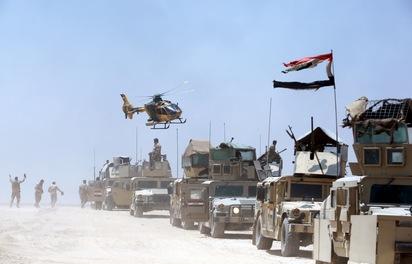
Ένα ιρακινό ελικόπτερο πετά πάνω από στρατιωτικά οχήματα στην Husaybah, στην επαρχία Ανμπάρ, στις 22 Ιουλίου 2015. REUTERS
Απογοητευμένο με την αργή πρόοδο των Ηνωμένων Πολιτειών κατά του αυτοαποκαλούμενου Ισλαμικού Κράτους (επίσης γνωστού ως ISIS), το Ιράκ φλερτάρει με την ιδέα να κάνει την Ρωσία τον κύριο εταίρο του στη μάχη. Ο ιρακινός στρατός ανακοίνωσε την περασμένη εβδομάδα ότι είχε συνάψει μια συμφωνία ανταλλαγής πληροφοριών [2] με το Ιράν, την Ρωσία και την Συρία. Ο Haider al-Abadi, ο πρωθυπουργός του Ιράκ, δήλωσε πρόσφατα ότι είναι ανοικτός στην ιδέα [3] να επιτρέψει ρωσικές αεροπορικές επιδρομές στο Ιράκ. Και ο με μεγάλη επιρροή Σιίτης κληρικός Αγιατολάχ Αλί αλ-Σιστανί έκανε έκκληση για μεγαλύτερη διεθνή συμμετοχή [4] στην καταπολέμηση του ISIS, υπαινισσόμενος ότι, επίσης, θα επιθυμούσε την υποστήριξη της Ρωσίας.


